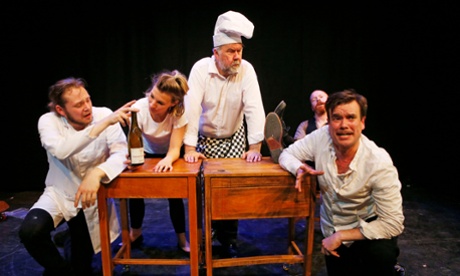
I was astounded and flattered when British director David Byrne told me he was writing and directing a play, Down and Out in Paris and London, that intertwines George Orwell’s famous 1933 book with my considerably less famous book, Hard Work, written 70 years later. The idea is to show that the grinding poverty Orwell reported on is with us still, its features often the same. The powerlessness, disrespect, bullying and sub-survivable pay of minimum-wage jobs now have all the same features of Orwell’s brutal experiences.
His flea-ridden, bed-bug lodgings in Paris, with their array of exotic and desperate characters clinging on, leap to life on the stage. Sharply acted, his tragic-comic denizens bristle with anger, absurdity, drink, rows, near-starvation and knife-edge aggression. His kitchen work as a plongeur – restaurant dishwasher – is so harrowingly vivid you can almost smell the steaming filthy water from the auditorium. This isn’t agit-prop, but re-imagined as theatre, it breathes new energy and humour into the people and stories, threaded through with the physical reality of poverty.
In my book, I lived on a council estate in Lambeth, near where I lived, yet a world away. I took whatever minimum wage jobs I could find from the job centre – as a cake packer, call centre operative, hospital cleaner, hospital porter, nursery assistant and care home worker. My tales are interleaved with Orwell’s, scenes craftily segue from him to me and back again, drawing then-and-now parallels – though how disconcerting to watch myself more or less meeting him: as for most journalists, he is, of course, a hero.
It feels odd to see yourself portrayed on the stage. Frankly, it’s uncomfortable, embarrassing and a bit aggravating. The actor (Carole Street) looks quite like me, yet isn’t me and, in truth, I want to jump up and play myself: smile more! Don’t be grim, be angrier! No, no, that’s not me at all, not at all! I’ve only seen an early run-through of the play before it set off for the Edinburgh festival: I’ll catch up with it in the last weekend, by which time it will be buffed up and burnished, ready, they all hope, to transfer to London. Will the Polly Toynbee on the stage seem any more like me by then? No doubt if Orwell was sitting in the seat beside me, he’d be biting his lip too – though he’s played very well by Richard Delaney, considerably better looking than gaunt photographs of the real writer.
What binds the books together is the experience of two middle-class travellers in the world of poverty; tourists with notebooks bringing stories back to the well-heeled, book-reading public.
Crossing the great social chasm, you hope to bring your readers with you on the journey: look, this is what it would feel like if you were suddenly plunged into low-pay semi-destitution. If you think you can manage on the minimum wage, you can’t. I couldn’t afford a tube ride, Nurofen or more than three light bulbs,; I had money to live on rice and lentils, not starving but not one pleasure, ever.
Seventy years earlier, Orwell saw brutal hardship that is rarer these days, though you can still find it among rough sleepers. What hasn’t changed is how the low-paid are treated: go here, line up, take a form, come back tomorrow, sorry no, the jobs are all gone. Walking miles, waiting at agencies, your time regarded as worthless when every unpaid hour means more penury.
Instead of a louse-infested lodging-house bed, the poor can get a clean new one now for £5 a week from BrightHouse, the furniture store for people who can’t afford to buy things except on the never-never at an astronomic APR so that they end up paying £850 for a £250 bed over the years: debt bondage. What doesn’t changes is the dreary struggle of only just getting by. Things are worse now than when I wrote my book, with tax credit cuts and no social fund, a promised higher minimum wage not nearly compensating for £12bn now to be lost in benefits. Poor relief scarcely existed in Orwell’s day and its administration was punitive, then as now. The politics of poverty never change: giving the poor more risks the moral hazard of encouraging idleness and undermining the work ethic of the working stiff. Orwell would be disappointed, but I think not surprised that so little of importance has changed.
- At Pleasance Courtyard, Edinburgh, until 31 August. Box office: 0131-226 0000

